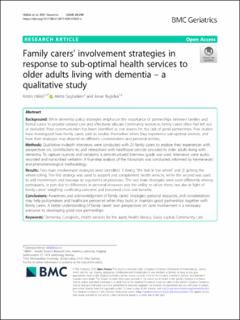Family carers’ involvement strategies in response to sub-optimal health services to older adults living with dementia – a qualitative study
Peer reviewed, Journal article
Published version
Permanent lenke
https://hdl.handle.net/11250/2760589Utgivelsesdato
2020-08-17Metadata
Vis full innførselSamlinger
Sammendrag
Background:While dementia policy strategies emphasize the importance of partnerships between families andformal carers to provide tailored care and effectively allocate community resources, family carers often feel left outor excluded. Poor communication has been identified as one reason for the lack of good partnerships. Few studieshave investigated how family carers seek to involve themselves when they experience sub-optimal services, andhow their strategies may depend on different considerations and personal abilities.Methods:Qualitative in-depth interviews were conducted with 23 family carers to explore their experiences with,perspectives on, contributions to, and interactions with healthcare services provided to older adults living withdementia. To capture nuances and variations, a semi-structured interview guide was used. Interviews were audio-recorded and transcribed verbatim. A four-step analysis of the transcripts was conducted, informed by hermeneuticand phenomenological methodology.Results:Two main involvement strategies were identified: 1) being“the hub in the wheel”and 2) getting thewheel rolling. The first strategy was used to support and complement health services, while the second was usedto add momentum and leverage to arguments or processes. The two main strategies were used differently amongparticipants, in part due to differences in personal resources and the ability to utilize these, but also in light offamily carers’weighing conflicting concerns and perceived costs and benefits.Conclusions:Awareness and acknowledgment of family carers’strategies, personal resources, and considerationsmay help policymakers and healthcare personnel when they build or maintain good partnerships together withfamily carers. A better understanding of family carers’own perspectives on carer involvement is a necessaryprecursor to developing good care partnerships.

